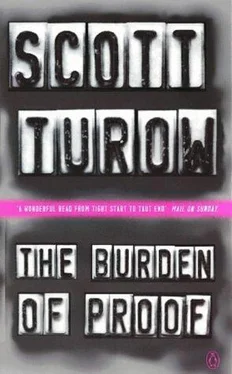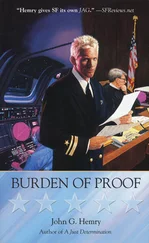Scott Turow - The Burden of Proof
Здесь есть возможность читать онлайн «Scott Turow - The Burden of Proof» весь текст электронной книги совершенно бесплатно (целиком полную версию без сокращений). В некоторых случаях можно слушать аудио, скачать через торрент в формате fb2 и присутствует краткое содержание. Жанр: Детектив, на английском языке. Описание произведения, (предисловие) а так же отзывы посетителей доступны на портале библиотеки ЛибКат.
- Название:The Burden of Proof
- Автор:
- Жанр:
- Год:неизвестен
- ISBN:нет данных
- Рейтинг книги:3 / 5. Голосов: 1
-
Избранное:Добавить в избранное
- Отзывы:
-
Ваша оценка:
- 60
- 1
- 2
- 3
- 4
- 5
The Burden of Proof: краткое содержание, описание и аннотация
Предлагаем к чтению аннотацию, описание, краткое содержание или предисловие (зависит от того, что написал сам автор книги «The Burden of Proof»). Если вы не нашли необходимую информацию о книге — напишите в комментариях, мы постараемся отыскать её.
The Burden of Proof — читать онлайн бесплатно полную книгу (весь текст) целиком
Ниже представлен текст книги, разбитый по страницам. Система сохранения места последней прочитанной страницы, позволяет с удобством читать онлайн бесплатно книгу «The Burden of Proof», без необходимости каждый раз заново искать на чём Вы остановились. Поставьте закладку, и сможете в любой момент перейти на страницу, на которой закончили чтение.
Интервал:
Закладка:
Stern had stood to close the door and after a 'brief preface came to the point.
"Dixon Harmell is being investigated by a federal grand jury."
"'Ooo," said John. He looked like a carpenter who had just walloped his thumb.
"Yes. It is very unpleasant."
"What for?"
"Well, I think I should let someone else explain the details to you. In general, the government seems to suspect some form of improper trading ahead of customer orders. Has anyone from the FBI attempted to speak with you? A chap named Kyle Horn?"
John shook his head. He didn't think so. "What does he look like?"
"Big fellow." Big blond goyishe,looking lunk in a Cheap sport coat, thought Stern. But that would not do.
John again shook his head uncertainly. You would think FBI credentials might make an impression, even on John, but there was never any telling.
Stern removed the subpoena from his briefcase and tried to explain what it meant.
"Due to our relationship-yours and mine-the prosecutors were courteous enough to allow me to receive this for you.
However, because I already represent Dixon, you should consult with another lawyer before you answer the government' s questions."
What kind of questions?"
"I could speculate, John, but that would probably notbe best."
John squinted. He didn't get it, of course. Stern explained that the government believed he had valuable information.
"They want to use me to get him?"
"Exactly."
The large baffled look Stern would have predicted rose up in John's eyes. A deer in the road. He had no idea what to do. The conflicts were between all the simple things that he took as harmonious. Loyalty.
Truthfulness. Selfpreservation.
"John, you and your lawyer must decide whether you wish to negotiate with the government for immunity. If that is the case, then your lawyer will give the prosecutors a prediction, a proffer, of what you would say."
"Yeah,"' said John, "but what if I don't want to talk?"
"Again, John, that is a good question for you to put to your lawyer. But the government can always choose to grant -you immunity without regard to your desires, in which event your choices are between answering questions and jail."
"Jail?" John took this in, too, with continuing ponderous reflection. "I really don't know that much."
As this conversation proceeded, Stern had gradually felt his heart declining, and with this response, it plunged the remaining distance.
'Not that much,' said John. But more than nothing at all. Dixon would be safe only with virtual amnesia on John's part. Even the vaguest memory of who was behind the trades would do for the government, especially if they succeeded in tracing the profits into Dixon's hands.
And sitting here, his son-in-law exhibited fi discomfort most telling to a practiced eye. There was no outraged inquiry from John about what this trading ahead had to do with him, or how the prosecutors might have gotten his name. He knew the govemment's interest in him was well placed.
"What does he say about all this? Dixon? Can you say?"
Stern shook his head. But he felt for an instant like holding his breath. A moment of the most delicate sort had arisen. With somebody else., another employee, Stern would have ventured a comment whose direction was as faint but discernible as an idling wind: 'This is, of course, a critical matter for Dixon, his entire life and business are at stake." But John was without subtlety. He might ask an impossible question-'You mean I should lie?"--or, even worse, take Stern's comments as a commandment. In all, Dixon and Stern-would have to trust John's lawyer to make the appropriate assessments and to offer the correct guidance.
"Where am I going to get this lawyer from?" John asked. "!
"I have some names I might suggest, if you would like."
"Oh, sure."
"'MD will indemnify you-pay your expenses so you need not worry about that."
Stern was working on the list right now, writing on a piece of office stationery, names and phone numbers. George Mason. Raymond Horgan. No one would quite manage to reconcile the diverse needs of John's circumstances as well as he could have, but that was out of the question, and Stern, in any event, saw the wisdom of his not serving as scOUtmaster on this trail. Just these few minutes had changed his estimate of John for good.
John took the list and shrugged. He had better get back to the floor, he said. He continued to wear his usual look, furtive and confused.
Watching John hulk off to the elevator, Stern felt a ruthless anger with Dixon gathering again. How could he? How could he have embroiled this boy in the usual piggish market high jinks? But the answer was too obvious. Dixon with his infallible calculation of what was best for himself had no doubt recognized that his greatest protection was in a family member less experienced in the business. Easiest probably to give sotto-voce instructions, knowing they would not be questioned, or, if the time came, willingly recalled. Soon, Stern was going to have to turn his attention to the issue of when and how to get out of the case.
If there was an indictment and John was a government witness, Stern could never handle the matter at trial. Cross examining his daughter s husban was unthinkable. Perhaps he should also give a list of lawyers to Dixon and exit post haste. But he recognized his own lack of conviction. Just now, Stern was not eager to sever any other long-term relations. And he had resisted breaking with Dixon for many years.
Part of that, of course, was for Silvia's sake. Nor should one overlook the force of gratitude. Much of Stern's present practice, in which he most often represented lawyers and bankers and corporate officials, could be attributed to the fact that he had become known as Dixon's lawyer. It had been his exit from the grimy world of the police courts into the arena of high-class crime-embezzlements and frauds, tax matters, bribery, and now and then a murder of passion. Dixon-a classy borderline operator-had, by the peculiar logic of these things, elevated Stern, and it was virtually an instinct in him never to give short shrift to anyone who had helped him in his practice.
Yet he knew that the things that attached him to Dixon. were not simply.external. After thirty-two years practicing law, though his acquaintances were legion, his admirers many, Stern, in a way he seldom felt inclined to meditate upon, was apt at times to feel somehow abandoned-left to himself. Oh, there were hundreds of persons he cared for, whose lives and ideas interested him, and with whom he felt an eager mutuality. He got on the elevator in the courthouse and there were always half a dozen people to 'greet him. He was well known, likable, eager to. please, and reluctant to give offense. Stern had his circle, mostly men near his age, primarily lawyers and judges, a number of them Yiddish speakers like his mother, subtle, clever people whose talk of books and sports and business gossip he regularly shared over lunch and sincerely valued. Good company- But he had in mind more than that. He meant the kind of unguarded male affinity that young men on teams, in gangs, on street corners had. Did women, domestication, destroy that? Or the fieme struggles of the daily world where every man was your enemy? Who knew? Yet Dixon remained. He was present. Stern could pay him no further compliment. But, like a granite marker beside the road, Dixon seemed to be the man who had always been nearby.
My brother-in-law, thought Stern, alone in the tiny room where John had abandoned him. Brother. In. Law. What kind of peculiar term was that?
TO Kindle County Symphony Hall, with its wedding-cake balconies and ceiling frosted with wreaths of gold, where Clara Mittlet and Alejandro Stern had Passed their initial evening together, Stern now came on his first night out with Helen Dudak. The coincidence did not strike him until Adolph Fronz, the elderly conductor, raised his baton, and then the thought quickly added to Stern's discomfort. He had very nearly broken this engagement; only his kindly, impulses toward Helen and his reluctance to offend her had made him carry through. It was a sad fact, shameful, awful-choose your pejorative ad-jective-but Radczyk's report had taken something from him that even the moment in the garage doorway had not. He had been a larger and more essential failure than he had imagined. Sex mattered. Ever and always. This he was learning, and his feelings now-alternating between vertiginous rage and desolation-left him deeply disinclined toward any female. The notion of spending an entire night attempting to be the charming, alluring gentleman of a few weeks before was simply out of the question. At the last moment, having spied tonight's tickets for one of Clara's many symphony series thumbtacked to the kitchen bulletin board, he had phoned Helen to propose this change. 'I cooked,' Helen said simply. Music, then supper later, perhaps? 'All right." Helen was obliging. He found himself enormously relieved.
Читать дальшеИнтервал:
Закладка:
Похожие книги на «The Burden of Proof»
Представляем Вашему вниманию похожие книги на «The Burden of Proof» списком для выбора. Мы отобрали схожую по названию и смыслу литературу в надежде предоставить читателям больше вариантов отыскать новые, интересные, ещё непрочитанные произведения.
Обсуждение, отзывы о книге «The Burden of Proof» и просто собственные мнения читателей. Оставьте ваши комментарии, напишите, что Вы думаете о произведении, его смысле или главных героях. Укажите что конкретно понравилось, а что нет, и почему Вы так считаете.












